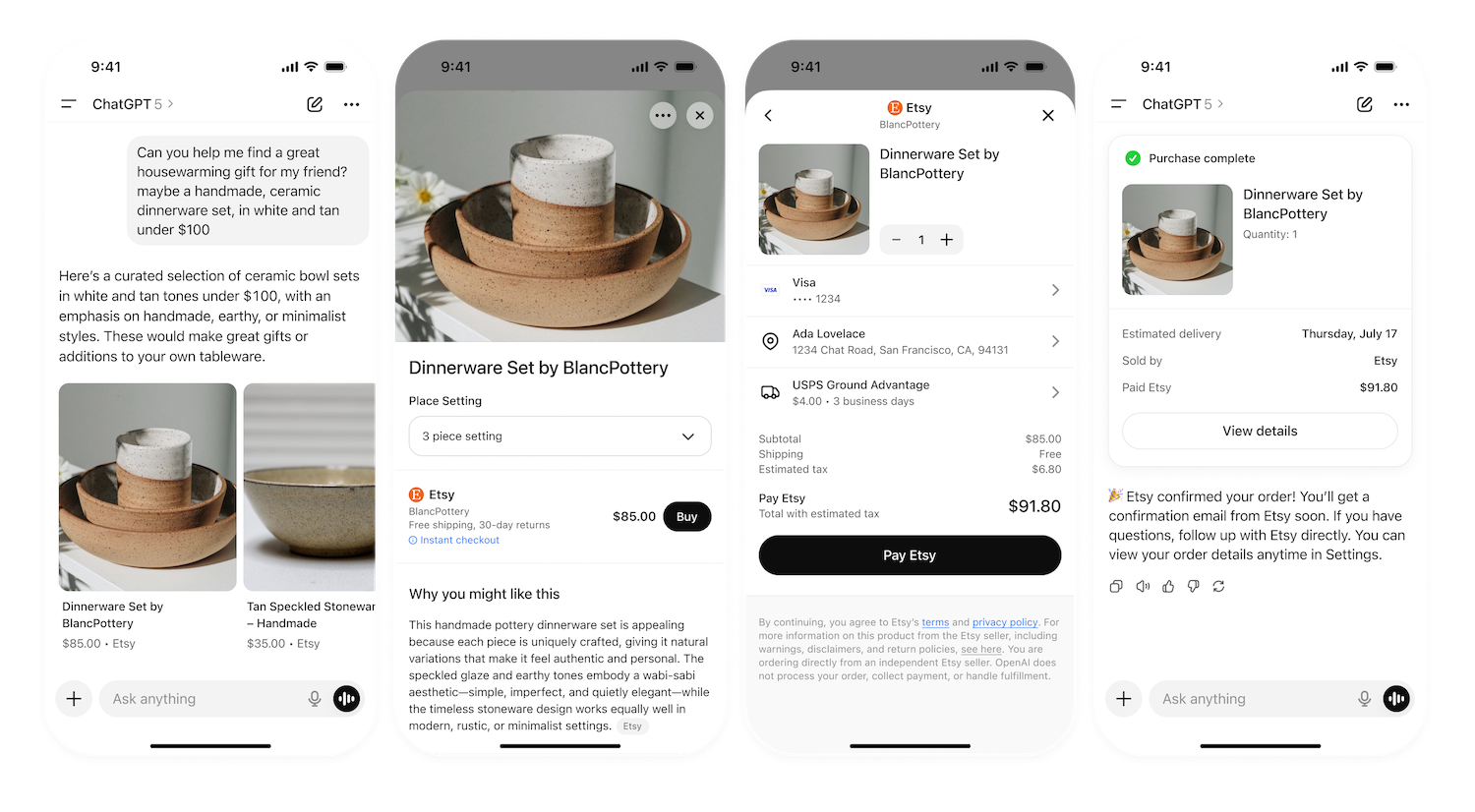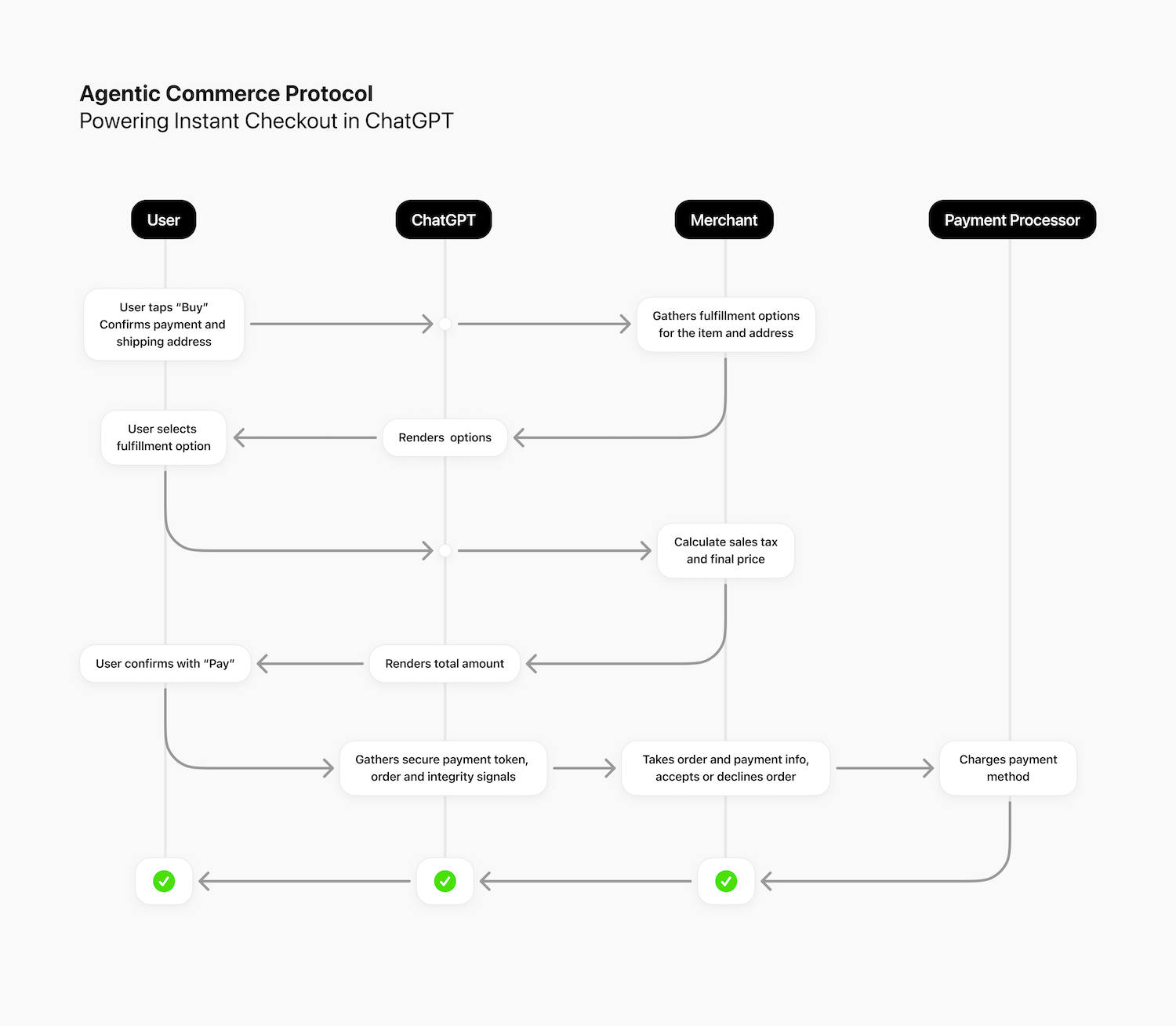Agentic Commerce Protocol (ACP): How AI Is Transforming Online Retail

Trutz Fries
Artificial intelligence is already part of everyday life - with chatbots, product recommendations, and voice assistants. But with the Agentic Commerce Protocol (ACP), online retail is entering a new era: products can now be purchased directly inside AI assistants like ChatGPT, without detours through a traditional webshop.
For brands and retailers, this represents the opening of an entirely new sales channel. However, it also raises critical strategic questions: Who controls customer access? What implementation effort is required? And what opportunities - along with potential risks - does this create?
What Is Agentic Commerce?
The term Agentic Commerce describes a fundamentally new shopping paradigm: Instead of customers navigating through online shops, an AI agent takes over the entire purchasing process.
Consider this scenario: A user asks ChatGPT for “a gift for a friend.” Rather than simply displaying recommendations, ChatGPT can now directly list products, suggest appropriate options, and - if requested - complete the entire purchase within the chat interface.

The Agentic Commerce Protocol (ACP) is the technical standard that enables this seamless communication between AI assistants and merchants. Rather than replacing existing shops, ACP connects current systems - including product data, checkout processes, payment processing, and shipping - with a revolutionary new interface.
Strategic Relevance for Brands and Retailers
Shifting Power Centers
Traditionally, Google, Amazon, and major marketplaces have dominated the customer journey. With ACP, product discovery is increasingly shifting to AI-powered assistants. This evolution could significantly weaken the influence of traditional gatekeepers while providing brands with unprecedented direct access to customers.
New Sales Channels
Retailers implementing ACP can make their products discoverable within ChatGPT and, in the future, within any compatible AI assistant. This creates an entirely new sales channel with potentially massive reach.
Competitive Landscape: OpenAI vs. Amazon
With ACP, OpenAI is deliberately positioning itself against established e-commerce ecosystems. Amazon will likely not support ACP, as it would threaten their central role as a purchase process gatekeeper. Google, meanwhile, is developing its own standard called “AP2,” while Microsoft is forming strategic partnerships with OpenAI. For merchants, this means the competitive landscape is becoming increasingly fragmented - making early experimentation and experience crucial.
Opportunities and Risks
The greatest opportunity lies in establishing early presence within AI’s digital storefronts, where purchase decisions are increasingly being made. However, this development carries substantial risk: merchants may become dependent on platforms like OpenAI, which could potentially impose fees or control product visibility according to their own policies.
How Does the Agentic Commerce Protocol (ACP) Work?
ACP defines how an AI assistant communicates with a shop system - here’s how it works in simple terms:
-
Product Search: Merchants provide a data feed (similar to Google Shopping), containing products, prices, and inventory.
-
Purchase in Chat: The user selects a product and clicks “Buy” inside the chat.
-
Data Transfer: ChatGPT sends the order details (product, address, payment method) via ACP to the shop system.
-
Merchant Verification: The shop system checks inventory, taxes, shipping costs, and responds: order accepted or declined.
-
Confirmation: The customer receives order confirmation directly in the chat.
Important: The merchant always remains the seller (Merchant of Record). Customer service, shipping, and legal responsibilities still lie with the merchant - not with OpenAI.

How Does Payment Work?
Payment processing represents a critical challenge, and ACP has developed an elegant solution.
Rather than handling plaintext data, ACP employs secure tokens: ChatGPT never stores credit card information but instead generates a one-time, limited payment token that’s valid exclusively for that specific purchase and merchant.
For merchants already using Stripe, integration is remarkably straightforward - ACP payments can often be accepted with just one additional line of code. Other payment providers can be integrated through the open Delegated Payments protocol. From the customer’s perspective, the experience is completely seamless: users can pay with their linked credit card, Apple Pay, or Google Pay from their ChatGPT account, while merchants receive funds through their existing payment infrastructure.
Implementation Effort for Online Shops
How complex is implementation? The good news: The effort required is quite manageable.
The process begins with merchants providing a comprehensive product data feed. The shop system must then be made ACP-compatible to receive orders and payment information. The key advantage: integration is minimally invasive - existing processes like inventory management, payment processing, and fulfillment remain completely untouched, as ACP simply connects to the existing infrastructure. Major providers like Shopify are already developing integrations, so merchants may soon be able to “click to enable” rather than requiring custom development.
Currently, ACP is operating in pilot projects (including Etsy in the U.S.), but merchants can already apply for early access.
Conclusion and Outlook
The Agentic Commerce Protocol has the potential to fundamentally transform online retail in the long term.
The opportunities are substantial: merchants can reach customers precisely where purchase decisions are being made - directly within AI chat interfaces. Early adopters secure valuable visibility in an emerging channel. However, new dependencies on platforms like OpenAI are emerging, which could increasingly influence product visibility, fee structures, and data control.
The strategic key will be whether merchants view ACP as a complement - not a replacement - for their existing operations. A diversified approach combining traditional e-commerce, marketplaces, and emerging channels like ACP offers the strongest protection against platform dependency.
One thing is certain: Agentic Commerce is far more than a buzzword. It could become the new standard for how customers shop online in the future. Brands that experiment early will secure a significant competitive advantage.
Subscribe to Newsletter
Get the latest Amazon tips and updates delivered to your inbox.
We respect your privacy. Unsubscribe anytime.

